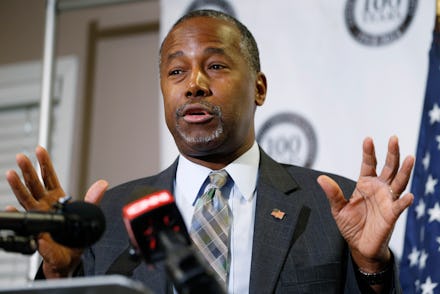No, Ben Carson, You Need to Be Educated on the Minimum Wage and Unemployment

At the fourth Republican primary presidential debate in Milwaukee, host Neil Cavuto asked the assembled candidates whether or not they would support raising the federal minimum wage.
None would (Donald Trump bizarrely said wages were already "too high"), but neurosurgeon and current second-place candidate Ben Carson went a step beyond by suggesting Americans simply don't understand that being paid more for the same labor ultimately ends up hurting them.
Carson said that every time the minimum wage increases, the economy sheds jobs — a claim that, at the very least, is inaccurate. He also claimed that high unemployment among black youth is due to "high wages."
"As far as the minimum wage is concerned, people need to be educated on the minimum wage," Carson told the audience. "Every time we raise the minimum wage, the number of jobless people increases. This is particularly a problem in the black community. Only 19.8% of black teenagers have a job, or are looking for one. That's because of those high wages. If you lower those wages, that comes down."
However, analysis by the left-leaning Center for Economic and Policy Research found job creation in 2014 was actually faster in states that raised their minimum wage. CEPR's researchers wrote, "Of the 13 states that increased their minimum wage in early 2014, all but one (New Jersey) are seeing employment gains. Furthermore, nine of the remaining 12 states are above the median for this period."
Most economists are in agreement that incremental increases to the minimum wage have marginal effects on employment.
"Economists have found that in many scenarios, raising the minimum wage has either no or marginal impact on employment," wrote Mic's Zeeshan Aleem earlier this year. "A 2009 meta-study of 64 minimum-wage studies ranging from the 1970s through the 2000s found little or no evidence that raising the minimum wage produces discernible increases in unemployment. In 2013, the Center for Economic Policy Research conducted a review of the most recent literature in the field and also found low-wage workers did not face dimmer employment prospects when the minimum wage rose modestly."
In 2014, 600 economists signed a letter endorsing President Barack Obama's plan to raise the minimum wage to $10.10, arguing there would "little or no negative effect on the employment of minimum-wage workers" and that higher wages for low-income workers might boost the economy via increased domestic spending.
As for Carson's claim that high wages are responsible for black unemployment, the Economic Policy Institute recently concluded "increasing the minimum wage would substantially benefit both minority and nonminority workers." Danny Vinik wrote on the report's findings in the New Republic, "14.1% of workers who benefit from raising the minimum wage to $10.10 are black—more than four million in total. That's larger than their share of the overall workforce (11%)."